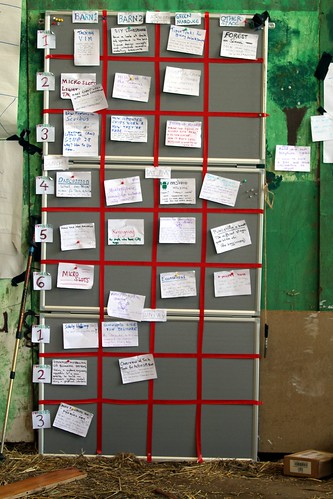1. Background
Here is a brief history of participatory, open, and/or collaborative workshop techniques.
No one likes to be lost in jargon, so let's (loosely) define three terms you will come across in this course.
Participatory - Trying to break down the barriers between the student and the teacher.
Open - In the context of this course, we'll define "open" loosely as removing barriers to education, which may include doing away with entry requirements, cost barriers, and cultural obstacles.
Collaborative - Collaborative processes help us move away from the dominant theory of single author works, or ownership by one organisation/individual of what is created or the tools used to create it.
Consensus and Popular Education as part of the Feminist, Peace and other Social Movements
Many of the techniques which we look at in this course for the delivery of collaborative workshops have links with techniques to help a decision making process based on consensus. Today, large sections of the grass roots environmental and social justice movement have been strongly influenced by adoption of consensus decision making by feminist and peace groups. The original source may well be "the Religious Society of Friends, or Quakers, who adopted the technique as early as the 17th century."
It is possible to trace the evolutions of these techniques as they spread from gathering to gathering and movement to movement over the years. The Teach-Ins founded in radical 60's anti-war and civil rights politics began to use some of the meeting techniques and egalitarian philosophy in a new context of radical politics.
Another visual and influential demonstration of these techniques in use was the Greenham Common Women's Camp in the 1980' s. Many of the resources used in this course are reused from the UK-based facilitation collective Seeds for Change who have done great work in documenting knowledge that was passed down informally.
Strong links exist to the egalitarianism ideals of , most obviously in its incarnation as part of libertarian politics in South America. Educators like Paulo Freire moved to remove the distinction between teacher and student, as well as the idea of the student as an empty vessel to be filled with the knowledge of an 'expert' educator.

Augusto Boal was influenced by Freire to create techniques know as the Theatre of the Oppressed. If you like the games that are a part of this course then be sure to check out his book, Games for Actors and Non Actors. It is a practical book that doesn't dwell on the theory but explains how different dramatic games can have a huge impact on the people playing them.
Into the Mainstream
Clearly you no longer have to be moving in radical circle to come across these techniques. It is interesting to see how some of these techniques created on the political front line have been taken up and developed by the modern business community and wider civil society.
Unconference & Open Space Events

You may have come across something known as Open Space Technology at community, tech or social media gatherings. These have various names including BarCamps, Open Spaces and Unconferences but all rely on similar techniques for creating a creative and collaborative environment.
The process of organising Unconferences has been well documented and you can have a look at some of the resources listed at the bottom of this section. However, organising sessions within unconferences can be a hit or miss affair. Many embedded skills are needed to make the most of the an open space, as well as the participants that arrive to fill it.
We hope the techniques in this course will help you in the process of designing and running your own collaborative, open, and participatory workshop!
Resources on Organising Open Spaces
- http://rhizomenetwork.wordpress.com/resources/#Facilitating%20Open%20Space
- http://www.openspaceworld.com/users_guide.htm
- http://www.openspaceworld.org
What makes an event participatory?
Describe an experience you have had that was participatory, open, and/or collaborative, and list the key factors that you think made it that way.
Post your response, or a link to it, below. Also if you have more information or thoughts to share about the background to participatory education techniques please do share them.


